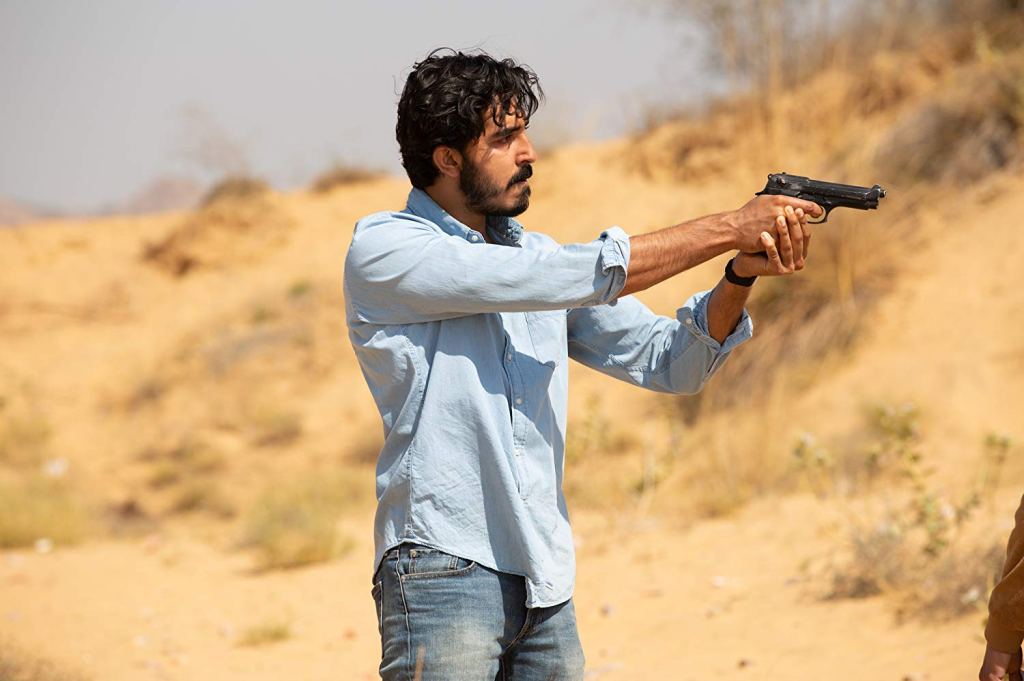It’s always best to eat before you go to a dinner party, just to be on the safe. The same goes for weddings, but more so, because they go on so long. As a unprofessional musician who’ll play it if you’ll hum it, I’ve attended more weddings than Elizabeth Taylor multiplied by Zsa Zsa Gabor to the power of Mickey Rooney. Usually, the father of the bride spoils the fun. Weddings should be marathon festivities with endless food and rivers of free booze, but they usually tend towards reheated salmon, dysenteric chicken, emetic fake fizz, and two of the saddest words in the history of human socializing, ‘pay bar’.
Jay, an Englishman of Pakistani extraction, is an enterprising fellow. To attend a wedding in Lahore, he takes four passports, two handguns, a roll of duct tape, a balaclava, and a set of those plastic cuffs that people who don’t behave on airplanes are given for free. As you may surmise, Jay (Dev Patel) hasn’t been invited. The Wedding Guest should not be confused with classics of the nuptial genre like Wedding Crashers. This heart-stopping kidnap thriller is more like a dark take on Runaway Bride. Or perhaps Four Passports and a Funeral.
The funeral is that of the nightwatchman that Jay is obliged to shoot as he drags the duct-taped, hand-cuffed, hooded bride from her uncle’s house on the night before the wedding. Samira, the kidnapee, is a British citizen in her early twenties, a university graduate who doesn’t cover her hair. She is being forced to marry an uncle back in Lahore.
There are sadder words in the lexicon of marriage, like ‘child marriage’ and ‘forced marriage’. This sort of thing seems to be a common occurrence in British Pakistani communities. The media doesn’t talk about it too much. This is because worst thing in the world is not the forced marriage of your fellow citizens, or even the sexual enslavement of underage girls, but the suspicion among your media chums that you’re insufficiently multiculti. In such circumstances, an uninvited guest like Jay looks heroic, not villainous. But the circumstances are so fluid that we’re never sure which he is, or wants to be.
When we see Jay preparing for his trip, we’re not sure if he’s a tourist or a terrorist. Terrorism moves under cover of tourism: the same shuffling of documents, clothes, tickets, SIM cards and car rental papers, except with the object of proving that you aren’t who you are. At first, we think Jay is the English boyfriend that Samira would rather be with. But something in the way he shoves her into the trunk of his rental suggests otherwise. He is a mercenary, commissioned by Deepesh, the unreliable son of wealthy British Hindus.
Now the story looks like an immigrant Romeo and Juliet, with Pakistani Muslim and Indian Hindu parents ranged against the star-cross’d lovers, and Jay as a heavily armed nursemaid or friar. It isn’t and it keeps changing, because director Michael Winterbottom shuffles the deck as ably as Jay with his passports. Deepesh (Jim Sarbh) gets cold feet because Jay has killed the night watchman. Samira (Radhika Apte) seems to get the hots for Jay, and Jay (Dev Patel) falls for her, but no one trusts anyone. Pretending to be a couple, Apte and Patel discover the secret of happy marriage, and sustain a heart-pounding mixture of erotic attraction and mutual distrust.
The Wedding Guest is properly thrilling, and it feels real without descending into subcontinental clichés about elephants. Samira and Jay are modern singles, modulating their accents and identities because they are plural in experience. Jay listens to Seventies rock to get himself in the mood for the kidnapping, and speaks neither Urdu nor Hindi. When Jay, Samira and Deepesh speak to each other, we hear inflections of the Caribbean-inflected ‘Jafaican’ accent of young Londoners. Harry Escott’s tense soundtrack is refreshingly devoid of tabla obbligati, too. This is a gripping modern variation on an ancient tale.
Winterbottom, The Wedding Guest’s director, also directed The Trip, with Steve Coogan and Rob Brydon as two selfish epicurean travelers. The finale of the second season of The Trip, The Trip to Italy, is that of John O’Hara’s Appointment in Samarra (1934). O’Hara’s protagonist, Julian English, learns of his imminent death and seeks to dodge it by fleeing Baghdad for Samarra, but death is waiting for him at his destination.
Somerset Maugham told this story in 1933, but it’s so old and so common that it has no author, only local repetitions. In 2007, Winterbottom told a variation on it in A Mighty Heart, on Wall Street Journal reporter Daniel Pearl’s fatal appointment in Pakistan. The Babylonian Talmud has a version involving King Solomon, two Africans scribes, and an appointment with the Angel of Death near ancient Luz, which was either identical to or near Bethel, north of Jerusalem. There might be another Luz on the Golan Heights, though. It doesn’t matter much. In this story, the destination is uncertain, but the end is always near.
Dominic Green is Life & Arts Editor of Spectator USA.


















